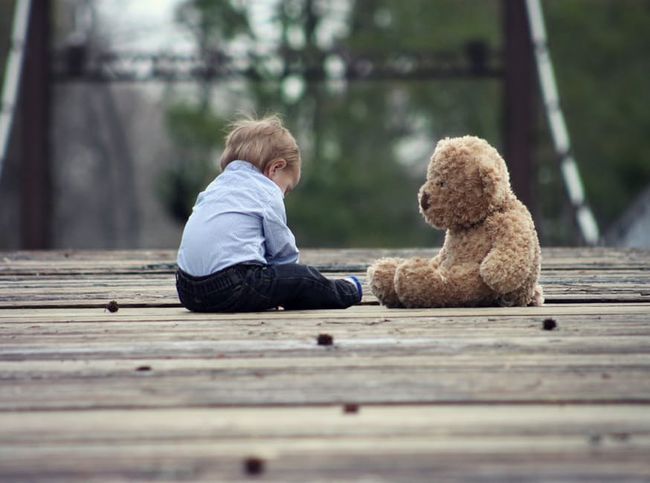We all feel sad sometimes and that is perfectly fine, but it can be doubly painful to see your kids upset about something, whether it is a death of a pet, a friend having moved away or simply having had a bad day at school.
It is important to speak to troubled children to find out what is wrong as they can lose sleep, drop behind in school or even display symptoms of psychological regression such as sucking their thumb, being very clingy or, in severe cases, bedwetting if you do not help them confront the issue head on.

Baby and a tedy bear. Image source: Pexels
Figure Out What’s Up
Before you sit down with your child, it might be good to have an idea about what is bothering them first. Talking to kids about difficult issues like death, divorce or moving home isn’t easy and sometimes we aren’t sure just how much they’re taking in so be on the lookout for telltale signs something’s not right. First, watch how they are playing. Are they happily making up their own games and stories? Are their toys having lots of fights and conversations about stuff that is mimicking real life? When kids see their parents argue, even if it is not a big deal, they instantly start to worry about it and can replay those conversations with their toys to make sense of everything.
Start a Conversation
Once you realize what is making them so unhappy try to become invested in the conversation. If you spot their toys being manhandled, shouted at or treated roughly or just hear something that concerns you, that is your way in. Casually remark that their poor toys seem to be having a bad day, or that the conversation they are having sounds interesting and you would like to learn more about it.
Be warned your child may say no initially so be patient as they typically come to you for help in their own time. You may do better communicating with your child if you get down to their level, becoming an active instead of a passive participant and being involved in the game. Child therapists use a range of cuddly toys, or custom bobbleheads bulk dolls when talking to kids so that expressing their emotions will seem much less scary.
Don’t Ignore Bad Behavior
Sometimes children act out just because they can, are hungry and overtired or because they feel like something is massively unfair such as having to eat vegetables before dessert. Most kids, at least those over three, tend to know when they are doing something wrong or behaving badly so try not to worry, as sooner or later, the tantrum will stop. However, if your once quiet child is getting into trouble at school, pushing other kids or lashing out at you physically, then there is something definitely wrong.

Girl holding a my little pony toy. Image source: Pexels
Start by telling them that their behavior is unacceptable and that ‘in this house, we do not hit or say mean things to others’ then give them the chance to explain their behavior. Remind them that you love them even when they are naughty and do not give up if they do not respond straight away. Sometimes kids need to process things themselves before they can discuss them with other people.

